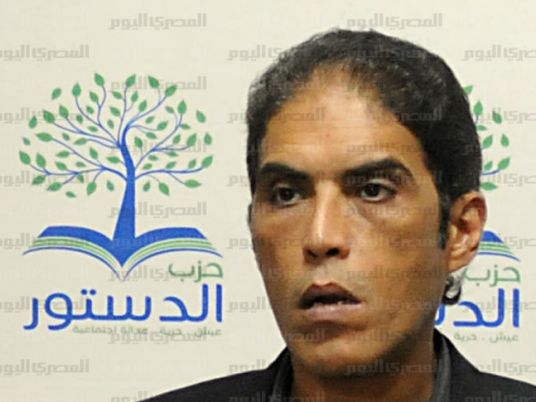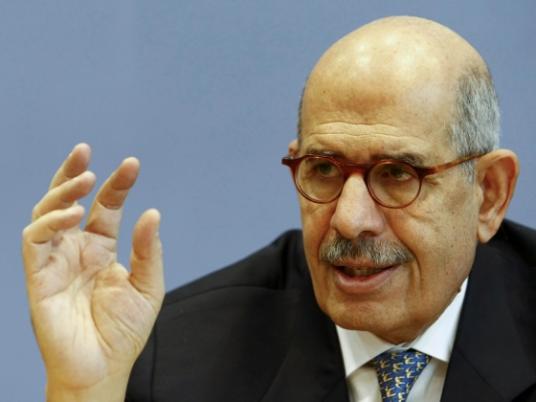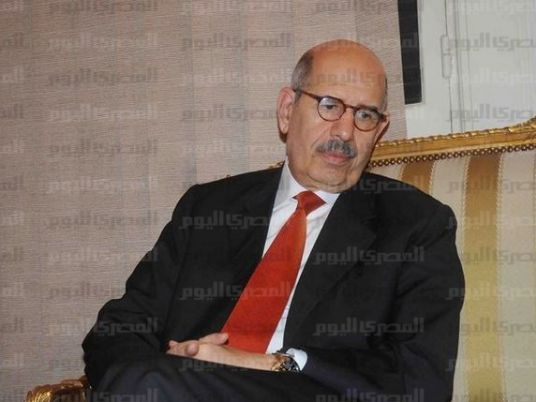More than 1000 people gathered Friday at the Cairo International Airport to welcome Mohamed ElBaradei, the former director general of the International Atomic Energy Agency (IAEA), who has become in the eyes of many a potential candidate for Egypt’s next presidential election.
Lined up in front of Terminal 3 since mid-day, youngsters from different political groups, as well as independents, came with animated pictures of ElBaradei and carried signs that read, “Welcome to you for the sake of change. With you and through you, for the sake of Egypt.”
It took about 100 young men and women to mobilize today’s gathering. Their immediate aim was to organize a civil get-together to welcome ElBaradei’s arrival from Austria, after 25 years of living outside of Egypt and as his term at the IAEA ends. But their longer term aim, they say, is to push for a constitutional change that can make the presidential election a more pluralistic and competitive process.
“When we were sure he was coming about a month ago, we started giving workshops to train people on how to organize themselves for the day,” says Israa Abdel Fattah, one of the organizers of the Popular Independent Campaign to Support ElBaradei’s Nomination. She was carrying a sign with ElBaradei’s name around her neck and going around the terminal checking her colleagues were well organized. Abdel Fattah was briefly arrested for trying to mobilize on Facebook a civil disobedience day in Egypt in protest of rising prices, back in 6 April 2008.
“This is just a beginning. People need to join forces, not for the sake of electing one person per se, but for the sake of changing a whole corrupt electoral system, for the sake of making a constitutional change happen, for the sake of people’s right to vote,” says an enthusiastic Abdel Fattah, adding that this campaign is an opener for ElBaradei and all other independents whose candidacy is not currently supported by the constitution.
Since 2 PM, activists flooded the outside pavement of Terminal 3, while public figures gathered inside the arrival’s hall.
“This whole gathering was called by the youth,” says Hassan Nafaa, professor and chair of the Political Science Department at Cairo University and columnist. “I had no role in organizing this whole gathering and didn’t even call for it in my articles.”
ElBaradei’s Austrian airline plane was scheduled to arrive at 3 PM, but ended up with a three-hour delay as it didn’t land before 6 PM, allegedly for inconvenient weather conditions in Vienna.
At his arrival, people clustered in front of the exit gate, singing the national anthem and clapping while shouting “Egypt”. The campaign’s organizers and the security of the airport tried to contain the agitated crowd by pushing them behind a cordon, but to no avail. ElBaradei moved to another gate, where the crowd gathered again blocking his way out. He stood still for a few minutes behind the closed glass gate, before he was escorted by security to exit through another arrival hall altogether. At the end, he was driven in a black jeep by the mass that has awaited him for four hours. He told a few journalists who managed to get close to him that he is in Egypt today to contribute to its quest for reform. "The next period will witness positive events in Egypt because of its children and youth," he said.
Some were disappointed for they were waiting for a public address. But for others, a more important point has been made.
“We have four messages today,” says Nasser Abdel Hamid, an organizer in the campaign and member of the Democratic Front Party. “The first message is for the West to know that there’s a third alternative to the regime and to the Islamists. The second message is for the regime to know that there’s someone that can challenge its quest for succession. The third message is for us, that we can achieve what we want, that we can organize ourselves and do proper political work in Egypt. The final message is for him [ElBaradei]. We assigned him to go through a battle for reform for which we can mobilize thousands of supporters.”
According to Abdel Hamid, their campaign’s demands are "realistic and achievable." They want a free and fair election, voting to be done electronically and through national ID cards, and Egyptians living abroad to be able to vote. After speaking with Al-Masry Al-Youm, Abdel Hamed went back to organizing his colleagues, making sure they don’t disrupt the public order in the street. Just last month, he was arrested, alongside another 30 activists who were heading to Upper Egypt’s Nagaa Hammadi to present condolences to families of victims of the recent sectarian attacks on Coptic Christmas. That didn’t stop him from pursuing his activism. According to him, many of the people present in today’s action are not part of any political movement. Few people came with their families to welcome ElBaradei.
News was circulating in some media and social networks ahead of today, warning of strong security presence on the road to the airport and fines for journalists with no permission to use their equipment inside the airport. While the process of getting to the airport was described by most people as smooth, others refrained from coming to avoid troubles.
“I think the security refrained from blocking today’s movement for two reasons,” says Mohamed Abdel Qoddous, head of the Press Syndicate’s Liberties Committee. “One is that Egypt is debating its human rights records at the Universal Periodic Review at the Human Rights Council in Geneva today. Another reason is that ElBaradei is a prominent figure.”
Besides making a broader statement for change, ElBaradei’s persona was referenced by supporters who came to welcome him. “He deserves all our support for he showed his will to contribute to reforming the country,” says Hamdi Qandil, journalist and columnist. “ElBaradei joins the Egyptian people in their quest for a democratic regime,” says novelist Alaa Al-Aswany, who refused condemning ElBaradei’s credibility on the basis that he has been living out of Egypt and is hence deemed an “outsider” by some.
But for Al-Aswany, and probably for others, today’s action is not necessarily a bet on ElBaradei per se, but rather is a step in a popular struggle for reform. “For anyone to think that an oppressive regime can turn into a democracy today or tomorrow, it is pure naiveté. For anyone to think that the struggle for democracy starts from zero is also naiveté. Democracy happens step by step. Today is an important step but is also an extension to 2005, the time when youngsters went to the streets and shouted down with Mubarak for the first time ever. People today are the offspring of 2005.”



